Ubasute
Ubasute (姥捨て, "abandoning an old woman", also called obasute and sometimes oyasute 親捨て "abandoning a parent") is the rare, old[1] practice of senicide in Japan, whereby an infirm or elderly relative was carried to a mountain, or some other remote, desolate place, and left there to die.[2] According to the Kodansha Illustrated Encyclopedia of Japan, ubasute "is the subject of legend, but… does not seem ever to have been a common custom".[1]

Folklore
Ubasute has left its mark on Japanese folklore, where it forms the basis of many legends, poems, and koans. In one Buddhist allegory, a son carries his mother up a mountain on his back. During the journey, she stretches out her arms, catching the twigs and scattering them in their wake, so that her son will be able to find the way home.
A poem commemorates the story:
In the depths of the mountains,
Whom was it for the aged mother snapped
One twig after another?
Heedless of herself
She did so
For the sake of her son
In popular culture
- The practice is discussed in some detail in Radiolab episode #305 Mortality. Ubasute sometimes appears as a metaphor for contemporary Japan's treatment of the elderly, who are noted for above-average suicide rates.[3]
- The practice of ubasute is explored at length in the Japanese novel The Ballad of Narayama (1956) by Shichirō Fukazawa. The novel was the basis for three films: Keisuke Kinoshita's The Ballad of Narayama (1958), Korean director Kim Ki-young's Goryeojang (1963), and Shohei Imamura's The Ballad of Narayama, which won the Palme d'Or in 1983.
- The Old Law, a 17th-century tragicomedy written by Thomas Middleton, William Rowley, and Philip Massinger and Anthony Trollope's 1882 dystopian novel, The Fixed Period also explore the concept of 'Ubasute' in a Western context.
- The characters of Christopher Buckley's 2007 novel Boomsday introduce the concept of 'Ubasute' as a political ploy to stave off the insolvency of social security as more and more of the aging US population reaches retirement age, angering the Religious Right and Baby Boomers.
- The concept of 'Ubasute' forms the basis of the storyline for the Star Trek: The Next Generation episode "Half a Life".
- The musical Pacific Overtures contains a reference to Ubasute. During the song 'Four Black Dragons', as a city is being evacuated for fear of an American naval force, a panicked merchant is willing to abandon his aged mother during the evacuation, but the merchant is reminded that his son could do the same when the merchant is just as old. The merchant reluctantly picks up his mother and carries her on his back.
- Episode 19 of Folktales from Japan depicts this tale.
- The Decemberists song "I Don't Mind" has a depiction of ubasute – "So here's you with your mom on your back, going into the woods..."
Places
- Ubasute-yama (姨捨山) is the common name of Kamuriki-yama (冠着山), a mountain (1,252 metres or 4,108 feet) in Chikuma, Nagano, Japan.[4][5]
- Obasute Station, Chikuma, Nagano Prefecture, Japan
- According to folklore, the Aokigahara forest at the base of Mount Fuji was once one of such sites, where its reputation as a suicide site might have originated.[6]
Similar practice in other cultures
References
- Japan, An Illustrated Encyclopedia, Tokyo: Kodansha, 1993, p. 1121.
- Hoffman, Michael (September 12, 2010). "Aging through the ages". The Japan Times. Retrieved 19 August 2016.
- Suicide 'epidemic' among Japan's elderly BBC News
- 冠着山 長野県の山 信州山学ガイド] (in Japanese)
- Hoffman
- "Suicide in Japan: Deep in the woods: Fewer Japanese are killing themselves". The Economist. January 30, 2016. p. 45.
Further reading
- Japan, An Illustrated Encyclopedia, Kodansha Ltd., Tokyo, 1993, p. 1121
External links
- What Japan can Offer to International Bioethics
- Folktale in Japanese, English version: